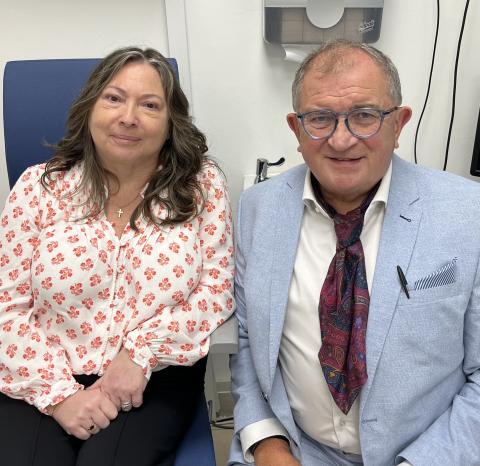Public Health Agency urges people to look after their eyes

The Public Health Agency (PHA) is highlighting the importance of looking after your eyes through all stages of life, including booking your regular eye tests and going to get your eyes checked if you notice worrying symptoms or changes in your eyes.
One local woman, who wishes to raise awareness, has shared her story after being diagnosed with a serious eye condition.
Gail Cairns first experienced vision loss, headaches and eye pain, but waited a week before visiting her optician. The Optician, Sam Baird, was able to carry out detailed scans and immediately referred her to hospital. Thanks to Sam’s swift action, Gail was seen quickly in the Emergency Department and was diagnosed with Non-Arteritic Ischemic Optic Neuropathy (NAION) and Pseudo Foster-Kennedy syndrome. These conditions cause intracranial pressure (swelling in the brain) which sadly caused damage to the optic nerve in Gail’s eye, and the delay in seeking medical help meant that permanent damage had already occurred. Gail has been left with partial sight and lasting vision loss.
Gail said: “My life has completely changed. My vision has decreased massively and I can’t drive anymore. But for me the hardest part was when I was in hospital and my three-year-old granddaughter was sitting on the bed and I couldn’t make out her face and her features. I just took a huge lump in my throat and it was like getting punched in the stomach, that was really hard to take.
“I wish I had gone to the optician as soon as my symptoms started. If I had been checked earlier in the week, my vision could have been saved. I don’t want anyone else to make the same mistake – please get your eyes tested regularly and never ignore changes in your sight. If you feel something is wrong please go to an optician and get your eyes checked.
“I am so thankful I came to see Sam first, because that made all the difference and meant I was able to be fast tracked through A&E. I can never thank him enough for what he did that day."
Dr Jackie McCall, Consultant in Public Health at the PHA, said: “One-in-five of us will experience sight loss in our lifetime, but more than half of cases can be prevented. There are lots of ways you can keep your eyes in better shape such as attending regular eye tests, being physically active, eating healthily and stopping smoking.
“A routine eye examination can often pick up the first signs of a sight loss condition even before there are any symptoms. Early detection and intervention could save your sight, or get a condition under control. As well as helping people to see better, a routine eye test can also detect a range of life-threatening conditions such as diabetes, cancer and heart disease, among others.
“If you ever experience sudden changes in your vision, pain, flashes of light or a shadow across your sight its vital to seek help straight away. Early diagnosis and treatment can make all the difference.”
In addition to the advice to seek urgent attention if an eye problem develops suddenly, the PHA recommends most people should have their eyes tested every two years, or more often if recommended by their optician. Anyone can develop sight problems, but some people are at a greater risk.
Regular eye tests are particularly important if you’re:
- over 60 years old
- from a certain ethnic group – for example, people from African-Caribbean communities are at greater risk of glaucoma and diabetes, and people from south Asian communities are at a greater risk of diabetes (diabetic retinopathy, where the retina becomes damaged, is a common complication of diabetes)
- someone with a learning disability
- from a family with a history of eye disease
Sam Baird, Optician, said: “We checked Gail’s eyes using the NI PEARS system. With this system we see both minor and major conditions. Gail’s condition was major. As a result of our tests the patient was able to go to the Ulster Hospital with scans and be admitted effectively with the correct treatment starting immediately. This makes such a difference to the patient’s outcome.
“This is a condition that could have been picked up in a routine eye test, before it got to the painful stage it reached. I recommend that you get your eyes tested regularly and help us, help you.”
The Northern Ireland Primary Eyecare Assessment and Referral Service (NI PEARS)
The Northern Ireland Primary Eyecare Assessment and Referral Service (NI PEARS) is a service provided by most optometry practices across Northern Ireland for patients who have developed a sudden eye problem within the previous 14 days. For information on the scheme, visit www.online.hscni.net/our-work/ophthalmic-services/eyes/
Other important steps you can take to maintain good eye health include:
- Stopping smoking – for outlined guidance and support visit www.StopSmokingNI.info
- Protecting your eyes in bright sunlight and/or glare. For tips, visit www.CareInTheSun.org
- Eating healthily and exercising regularly – for help and advice visit www.ChooseToLiveBetter.com
- Wearing safety goggles to protect your eyes while doing DIY, gardening, sporting activities and/or in the workplace if required.
- Taking regular and short breaks if working at a computer screen, phone or tablet.
For more information on how to look after your eyes, visit www.pha.site/LookAfterYourEyes
Eye examinations are free for many individuals. For information regarding eligibility for a free NHS eye test, please visit www.nidirect.gov.uk/eye-care
